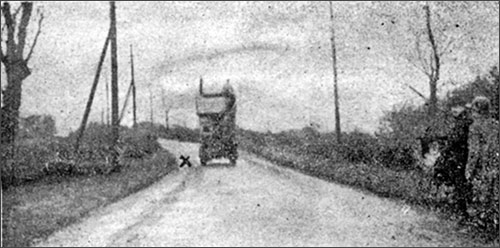| Extract from the Kettering Guardian Friday 7th Nov 1919 transcribed by Sarah Gilbert |
|||
|
|||
|
Kettering Man Instantly Killed at Burton Latimer |
|||
|
|
|||
The distressing fatality which occurred on Saturday, when Mr. Harry Charles Cheney, a Kettering shoe finisher, lost his life through colliding with a motor omnibus, formed the subject of an inquest on Monday afternoon, at the Duke’s Arms, Burton Latimer. Mr. J. T. Parker, County Divisional Coroner, conducted the proceedings, and Mr. W. Waters, parish constable, acted as his officer. Mr. C. E. Woolston (of Messrs. Burnham. Son, and Lewin, Wellingborough) watched the proceedings on behalf of the Wellingborough Motor Omnibus Co., Ltd., who were also represented by their general manager. Supt. Hooper and P. S. James, too, were present. RELATIVE AN EYE WITNESS Horace George Ambler, of Burton Latimer, identified the body as that of his brother-in-law. Deceased, he said, was 35 years of age, and lived at 65, Wood-street, Kettering. Witness was walking ten yards behind him on the main road between Burton and Kettering, about 20 minutes past 4 on Saturday afternoon, when a motor omnibus passed by. Deceased had just previously passed witness; he was riding a bicycle. Witness called out, “How are you, Harry?” but deceased neither answered nor turned his head. He looked very white and ill, and was going very slowly. The front part of the bus got past deceased on the right side, and he then wobbled and fell towards the ‘bus. Witness did not think the vehicle passed over him, but the hind wheel appeared to catch his foot after he had been hit by the body of the ‘bus. The driver left him plenty of room. Examining the photograph, now handed him by the Coroner, witness pointed to the exact spot where the accident occurred. In the course of further evidence he stated that the driver sounded his horn just before getting to deceased. He (deceased) wobbled towards the ‘bus, and not the ‘bus towards him. Witness attached no blame to the driver. Deceased had had four years in the Army, serving in India and Palestine. Two days before being demobilised he suffered very badly from malaria, and he had not been right since. On Saturday last he had been from Kettering to Rushden and was on his way back when the fatality occurred. He left home about one o’clock. When witness got to him he was dead. The Manager: Was deceased learning to ride? -Witness: No, he learned before he joined up, but four years without riding might make an “amateur” of him practically. Supt.Hooper: Do you know whether he was deaf or not?- Witness: No, he was not deaf at all. If he did not hear me, he must have been in a semi-conscious condition. In reply to the Coroner, witness said deceased and he were friendly. Usually deceased would get off his bike and walk along with him. PLENTY OF ROOM Richard Cockayne, of Burton Latimer, shoe-hand, stated that he was riding on the ‘bus towards Kettering. Witness saw deceased riding a bicycle in front of the ‘bus. He seemed to be struggling. A lorry went past, just in front of the ‘bus, and that seemed to take all his attention. When the front part of the ‘bus has passed him he turned towards the ‘bus and fell on to it. The ‘bus was pulled up within a few yards in response to the alarm the conductor gave by ringing the bell. Witness thought the driver left plenty of room. He (witness) got off the ‘bus, and went to deceased, but he did not speak or move. DRIVER’S STORY Edward Walter Longland, of Irthlingborough, the driver of the ‘bus, said he saw deceased just before getting to the bridge over the Cambridge line. Deceased had just got to the bottom of the incline of the bridge, and appeared to be struggling. Witness sounded his horn. Deceased was on his proper side, however, and witness passed him on his proper side. As witness passed him he glanced round and saw deceased lurch towards the ‘bus, which he (witness) accordingly swung more to the right. The Coroner: How fast were you going when this happened? –Witness: About ten or twelve miles an hour, sir. There was plenty of road. MEDICAL TESTIMONY Dr. Byrne, of Burton Latimer, said he saw deceased some five or six minutes after the accident. He was dead then. The right side of his skull was fractured as though he had fallen against the ‘bus, and his neck was broken, which seemed to indicate that the ‘bus had run over it. Probably the right side of his head caught against the left-hand rear mudguard. Death would be instantaneous. Malaria might have caused exhaustion and sudden loss of muscle-control. The deceased man’s sister informed the coroner that her brother had been a great sufferer from malaria. Summing up, the Coroner observed that the poor man would appear to have been practically an invalid. No blame attached to the driver or anyone else for his accidental death. Mr. Woolston expressed the company’s regret that the accident should have occurred, and sympathy with the bereaved relatives. The late Mr. Cheaney was intimately known and very highly esteemed by numerous friends associated with the Toller Congregational Church, having resumed attendance at that place of worship straightway upon his return from military service. He participated in the social held by the Young Men’s Bible Class only four nights before the fatality. In the course of prayer on Sunday evening the Rev. David Stephens made feeling allusion to his tragic death and the irreparable bereavement his wife and children had thereby sustained. The minister’s Communion address contained further sympathetic remarks. |
|||
